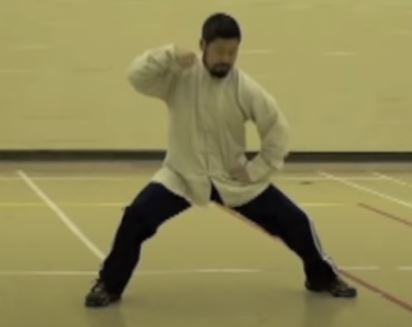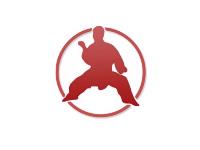A summary of our extended stay 2015
After beeing in Daqingshan, Shandong Province in China for 4 month we are on our way back to Berlin now. We, that is me, my wife Sarah and little son Lukas, 2 1/2 years old. The first time I have been on the mountain in 2010, in 2012 Sarah did join and in 2014 the three of us have been here already once all together.
So here´s my summary from this stay:
Beside the fact that I´m one of Master Chen´s disciples and therefore do have a strong relation to that place simply because it is kind of the center of our school, we all really love that place itself. Up the mountain, good air and teriffic nature, good food, etc.
Some things change, others don´t
But what I really app reciate is, that beside all changes happening on DQS all the time, there is something consistent. And I think, this has to do with the consistency of our syle of Taijiquan. Just like Master Chen, who to me seems always to keep on exploring new ways of teaching, the content, the principles and the core of his teaching, our Taiji, stays the same.
reciate is, that beside all changes happening on DQS all the time, there is something consistent. And I think, this has to do with the consistency of our syle of Taijiquan. Just like Master Chen, who to me seems always to keep on exploring new ways of teaching, the content, the principles and the core of his teaching, our Taiji, stays the same.
This might appear different in the beginning. I think, most of us know this situation, that we or someone might think that Master Chen did change things, today he is saying this and tomorrow something quite opposite, and also other classmates seems to do things very different, also (or especially?) the advanced ones and so on …
I personally think, the reason for that is that we still cannot see the principle very clear. The more this clears up, the less of these “differences” occur.
So for me, the mountain reflects this consistency somehow. Every year, externally there are things different, but the training is the same, even when Master Chen is not here in person.
The Trainer Team on DQS
 Meanwhile there is a really interessting trainer team on the mountain, there is a lot to learn and experience.
Meanwhile there is a really interessting trainer team on the mountain, there is a lot to learn and experience.
Of course nobody can replace Master Chen so far, but if one really wants to learn, I think this is not so important. Sometimes even to the contrary, to be with someone a bit better, but a little closer to oneselfs skill, might be very useful – always depends on how you can work together.
So my experience with the trainer team this year was just good.
 There is Chén Xù 陈旭, the head instructor after Master Chen, who is getting really clear in applications and who already developed a good skill in teaching. His English is advancing, but his skill even more, and therefore I think language is not that important. I did learn a lot form him doing pushhands together.
There is Chén Xù 陈旭, the head instructor after Master Chen, who is getting really clear in applications and who already developed a good skill in teaching. His English is advancing, but his skill even more, and therefore I think language is not that important. I did learn a lot form him doing pushhands together.
 Then there is Lǐ Xiǎohuī 李晓辉, who is very experienced in pushhands and competition. English and skillwise similar story like Chen Xu. The last evening I asked him if he like to do a last pushhands session with me, doing video taping as a reminder for me. I´m really looking forward to review this piece. He is, like Chen Xu, staying with the core principles very well, as far as I can judge. And he has techniques who are working.
Then there is Lǐ Xiǎohuī 李晓辉, who is very experienced in pushhands and competition. English and skillwise similar story like Chen Xu. The last evening I asked him if he like to do a last pushhands session with me, doing video taping as a reminder for me. I´m really looking forward to review this piece. He is, like Chen Xu, staying with the core principles very well, as far as I can judge. And he has techniques who are working.
Further I like to mention Lái Chūnléi 来春雷, quite new to our school, but also have already a lot to share. Some good technique, but more important an very good sense for humans and learning. And he as well is sticking to the principles very well.
Then another very nice guy in the trainer team there are Hán Ruì 韩瑞 and Líng Zilì 凌子力, both also can perform very good form and skills for pushhands.
Last but not least I like to mention Níng Dōngjí 宁东吉, he is also working in the office and beside our Taijiquan he is also learning the old Buddhist Theravada tradition. He is one of the few who are about to improve their English a bit more, and he is very enthusiastic about Taiji.
All of them to me are very inspiaring on the path of Taijiquan, and the reason why I introduce them here is following:
Communication, Language & Learning
I want to encourage everybody not to hesitate to start communication, though there might be language barriers.
Especially amoung Taiji-people, very often it is not that necessary to use spoken language, but communication in a general sense is the key to so much. Take initiative and use it. Otherwise we will tend to stay stucked in our own views and we will progress much less – I know this by my own experience. It does not feel good to expose oneselfs weaknesses …
Nevertheless, knowing some Chinese language is useful. Among the trainers and the staff English language is kind of limited, but it already has developed to a level where you can survive and have good training.
Useful Learning Tools
 For learning chinese I can recomment to use modern tools like touchscreen devices (tablets or smartphones) with certain apps. For dealing with chinese characters, these are a real gift. You can look up characters, some software also detect them by just taking a picture, you can ask Chinese people to type in whole sentences, use vocabulary flashcard trainer, record voice samples and so on.
For learning chinese I can recomment to use modern tools like touchscreen devices (tablets or smartphones) with certain apps. For dealing with chinese characters, these are a real gift. You can look up characters, some software also detect them by just taking a picture, you can ask Chinese people to type in whole sentences, use vocabulary flashcard trainer, record voice samples and so on.
I experienced the Android software pool as a huge treasure for learning (not only for language), but you have to take some time to sort out the garbige – as usual, when you are looking for content-wise valuable things, right?
Back to Taiji, I also want to recommend to use these litte video-cameras.
Record your Yilu here and there and watch yourself! Yes, I know, a lot of people don’t like that, but I think practitioners of “Chen Style Taijiquan Practical Method” already have realized, that real learning very likely goes along with leaving the zone of comfort, right?
Thanks to everybody – 谢谢你们!
Last but not least I like to thank everybody on the mountain and everybody who helped and is helping to develope this place. First of all Master Chen, of course. He is the father of this all, without his imagination and visions I think there would be nothing. But also without manpower and money this could not hold on.
Particulary I like to thank all the staff, especially Tim Duering for beeing so durable, though it is very challenging for him, getting older and beeing tortured by the weather and all kind of extra problems people like us will have – thank you for everything ;-), and then also last but not least all my gongfu brothers and sisters and the trainer team.
Thank you for all the good quality time!
So Chén Xù 陈旭, Lái Chūnléi 来春雷, Lǐ Xiǎohuī 李晓辉, Níng Dōngjí 宁东吉, Yīn Wénzhé 殷文哲, Líng Zilì 凌子力, Hán Ruì 韩瑞 and everybody else and the training place:
谢谢你们,我很高兴认识你们,也很高兴在好朋友,我们都练了很多!
音乐家说:”Keep on groovin!”, 我不确定有没有功夫家的翻译…
All best from some thousand meters above Russia now,
Michael





{ 1 comment… read it below or add one }
Nice post Michael! Your insights are always valuable. And, you are able to keep focus on the core elements amidst the huge changes on the mountain. Thank you for introducing the individual members of the team of instructors on Daqingshan; often we see their pictures on Facebook but find little information on them. Your descriptions and details of your interactions with them help bring us closer together as a family.